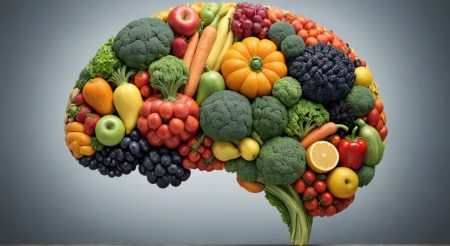Introduction
As we age, maintaining brain health becomes just as important as taking care of our physical health. Our brains are responsible for managing everything from memory and decision-making to problem-solving and emotional well-being. Over time, however, our cognitive abilities can start to decline, which is a natural part of aging. Yet, research shows that adopting certain habits can significantly slow down this process and even improve brain function in our later years.
Keeping the brain healthy is not just about avoiding diseases like dementia or Alzheimer’s, though those are serious concerns. It's also about staying mentally sharp, preserving memory, and enhancing our overall quality of life. Many of the same principles that promote physical health also benefit the brain, such as a nutritious diet, regular exercise, and proper sleep. On top of that, engaging the brain with mental challenges and social activities can strengthen neural connections, making it easier to retain information and adapt to new situations.
1. Stay Physically Active
Regular physical activity is one of the most effective ways to keep your brain healthy as you age. Exercise promotes increased blood flow to the brain, delivering essential oxygen and nutrients that help maintain cognitive function. Studies have shown that staying active can improve memory, attention, and even delay the onset of cognitive decline. Physical activity doesn’t have to be strenuous to be effective; even moderate, low-impact exercises can offer significant benefits for brain health.

Here are some key reasons why staying physically active boosts brain health:
- Improves blood flow and oxygenation: Exercise increases heart rate, which boosts blood circulation throughout the body, including the brain. This improved circulation delivers more oxygen and nutrients to brain cells, supporting cognitive function and helping to remove waste products that can build up over time.
- Supports the growth of new brain cells: Physical activity stimulates the production of brain-derived neurotrophic factor (BDNF), a protein that promotes the growth of new neurons and strengthens connections between them. This neuroplasticity is vital for learning, memory, and overall mental agility.
- Reduces the risk of cognitive decline: Regular exercise has been linked to a lower risk of developing conditions like Alzheimer's disease and dementia. Physical activity helps maintain cardiovascular health, which is closely connected to brain health. It also reduces inflammation, a contributing factor to cognitive decline.
Incorporating activities like walking, swimming, or yoga into your routine can help keep your mind sharp and protect your brain as you age. Aim for at least 150 minutes of moderate exercise per week for optimal brain health benefits.
2. Engage in Mental Exercises
Just as physical activity strengthens your body, mental exercises help keep your brain in top shape. Engaging in mentally stimulating activities is essential for preserving and enhancing cognitive function, especially as we age. Regular mental challenges can help improve memory, problem-solving skills, and even delay the onset of cognitive decline. The brain, much like a muscle, thrives on being challenged, and incorporating mental exercises into your daily routine is a great way to keep it sharp and healthy.

Here’s why mental exercises are vital for brain health:
- Promotes neuroplasticity: Mental exercises stimulate the brain, encouraging the formation of new neural pathways and strengthening existing ones. This process, known as neuroplasticity, is critical for learning and adapting to new information. Activities like puzzles, reading, learning new skills, or playing strategy games challenge the brain and promote cognitive flexibility, which enhances memory and problem-solving abilities.
- Reduces the risk of cognitive decline: Research shows that individuals who engage in regular mental activities are less likely to develop Alzheimer's disease or other forms of dementia. Activities such as crosswords, Sudoku, or memory games help the brain stay active and combat cognitive decline. Learning a new language or musical instrument can also create new connections in the brain, keeping it resilient against age-related degeneration.
By incorporating mentally stimulating activities into your daily routine, you can keep your brain agile and improve cognitive performance. Try dedicating time each day to solving puzzles, reading challenging material, or picking up a new hobby that requires focus and creativity. These mental exercises will keep your mind engaged and protect your brain as you age.
3. Eat a Brain-Boosting Diet
What you eat plays a crucial role in maintaining brain health, especially as you age. A nutrient-rich, balanced diet can support cognitive function, improve memory, and reduce the risk of neurodegenerative diseases like Alzheimer’s. Certain foods have been shown to boost brain function by providing essential nutrients, antioxidants, and healthy fats that protect brain cells from damage and support optimal mental performance.

Here’s why a brain-boosting diet is essential for cognitive health:
- Rich in antioxidants and anti-inflammatory compounds: Foods like berries, leafy greens, and nuts are high in antioxidants, which help combat oxidative stress—a major contributor to cognitive decline. Antioxidants protect brain cells from damage caused by free radicals, which are unstable molecules that can accelerate aging and neurodegeneration. Anti-inflammatory compounds found in foods like turmeric and fatty fish (rich in omega-3s) also help reduce inflammation, a factor associated with cognitive decline and Alzheimer’s disease.
- Supports memory and learning with healthy fats: Omega-3 fatty acids, found in foods like salmon, flaxseeds, and walnuts, are essential for brain health. These fats are key components of brain cell membranes and support the growth of new brain cells. Omega-3s have been linked to improved memory, concentration and a lower risk of age-related mental decline. A diet rich in these healthy fats helps preserve cognitive function and protects the brain from long-term damage.
- Provides essential vitamins and nutrients: Nutrients like B vitamins (B6, B12, and folate), vitamin E, and magnesium are important for maintaining cognitive function. These vitamins support brain energy production, enhance neurotransmitter function, and promote the formation of new neural connections. Whole grains, avocados, eggs, and green vegetables are great sources of these brain-supporting nutrients.
By focusing on a diet rich in antioxidants, healthy fats, and essential vitamins, you can nourish your brain and support long-term cognitive health. Try incorporating more brain-boosting foods like berries, fatty fish, and leafy greens into your meals to give your brain the nutrients it needs to thrive.
4. Get Enough Sleep
Adequate sleep is vital for maintaining both physical and mental health, particularly as we age. Sleep is the brain's opportunity to rest, repair, and reset, making it essential for cognitive function, memory consolidation, and emotional regulation. Without sufficient quality sleep, our brains become more prone to cognitive decline, memory problems, and mood disturbances. Getting 7-9 hours of uninterrupted sleep per night is critical for long-term brain health.

Here’s why getting enough sleep is crucial for cognitive well-being:
- Memory consolidation: During sleep, especially during the deep stages of non-REM sleep, the brain processes and consolidates memories. Information gathered during the day is transferred from short-term to long-term memory. Without enough sleep, this process is impaired, making it harder to remember new information or retain important details.
- Brain detoxification: While we sleep, the brain goes through a “clean-up” process, clearing out toxins and waste products that accumulate throughout the day. One of these is beta-amyloid, a protein linked to Alzheimer’s disease. When sleep is insufficient, the brain’s ability to eliminate these toxins diminishes, increasing the risk of neurodegenerative diseases.
- Mood and cognitive function: Poor sleep affects mood, focus, and decision-making abilities. Chronic sleep deprivation leads to irritability, difficulty concentrating, and impaired cognitive performance. Over time, this can result in more serious cognitive decline, including an increased risk of dementia and memory issues.
- Regulation of hormones: Sleep regulates important hormones like cortisol (the stress hormone) and insulin (which controls blood sugar). Imbalanced hormone levels from poor sleep can lead to cognitive dysfunction, heightened stress, and metabolic issues that negatively affect brain health.
To protect your brain, establish a consistent sleep routine by going to bed and waking up at the same time each day. Create a restful sleep environment by limiting exposure to screens before bed, keeping the room dark, and avoiding caffeine or heavy meals close to bedtime. Quality sleep will help your brain stay sharp and resilient over time.
5. Manage Stress Effectively
Chronic stress can take a serious toll on brain health, affecting memory, focus, and emotional well-being. When stress is left unmanaged, the brain produces high levels of cortisol, a hormone that can impair cognitive function and even lead to structural changes in the brain over time. Learning how to manage stress effectively is key to maintaining long-term brain health and mental clarity.

Here’s why managing stress is critical for cognitive health:
- Protects against cognitive decline: Prolonged exposure to stress hormones like cortisol can damage the hippocampus, the part of the brain responsible for memory and learning. This can lead to difficulties with memory retention and recall. Managing stress through relaxation techniques like deep breathing, meditation, or yoga can help lower cortisol levels, protecting brain cells and enhancing memory. Mindfulness-based practices have been shown to reduce stress and improve cognitive performance in both short-term and long-term scenarios.
- Enhances mental clarity and focus: High levels of stress can cause mental fatigue, making it harder to concentrate, solve problems, or make decisions. By adopting stress-reduction strategies, such as engaging in hobbies, practicing gratitude, or taking regular breaks, you can maintain mental clarity and focus. These activities promote relaxation and reduce the impact of stress on brain function, helping you stay sharp and focused even during challenging times.
Managing stress not only supports emotional well-being but also plays a crucial role in protecting your brain from long-term damage.
6. Stay Socially Active
Staying socially connected is a powerful way to protect and enhance brain health, especially as we age. Regular social engagement helps stimulate cognitive processes, boosts mental agility, and promotes emotional well-being. Isolation, on the other hand, has been linked to an increased risk of cognitive decline and memory loss. By maintaining meaningful social relationships, we create opportunities for mental stimulation and emotional support, both of which are crucial for long-term brain health.

Here’s how staying socially active benefits cognitive function:
- Stimulates the brain: Engaging in conversations, group activities, and social gatherings requires thinking, responding, and processing information in real time. This mental stimulation helps keep the brain active, sharpening cognitive abilities like memory, attention, and problem-solving.
- Reduces stress and boosts mood: Positive social interactions can lower levels of stress and anxiety, both of which negatively impact brain health. Socializing releases “feel-good” hormones like oxytocin, which helps reduce stress and improve overall mood, leading to better mental clarity and cognitive function.
- Promotes emotional support: Building and maintaining close relationships provides a sense of belonging and emotional support, which are essential for mental well-being. Emotional support can help combat loneliness, which has been shown to accelerate cognitive decline and increase the risk of conditions like dementia.
Staying socially active not only enriches life but also helps keep the brain engaged and resilient over time.
7. Keep Learning New Skills
Learning new skills is one of the most effective ways to keep your brain healthy and sharp. Whether it’s picking up a new hobby, learning a language, or mastering a musical instrument, challenging your brain with new tasks stimulates the creation of new neural pathways and strengthens existing ones. This process, known as neuroplasticity, is crucial for cognitive health, helping the brain adapt and stay resilient as we age.

Here’s why continuous learning benefits brain health:
- Encourages neuroplasticity: When we learn something new, the brain forms new connections between neurons, which strengthens overall cognitive function. These connections allow the brain to adapt to new information and challenges, improving memory, problem-solving skills, and the ability to process information more efficiently. The more you challenge your brain with novel tasks, the more flexible and capable it becomes.
- Improves memory and attention: Learning a new skill requires focus and concentration, which helps improve attention span and short-term memory. Whether it’s cooking a new recipe or trying a new form of exercise, the effort to learn and master the skill strengthens the brain’s ability to retain and recall information.
- Boosts confidence and mood: Acquiring new skills can also improve self-esteem and boost mood, which are important for mental well-being. Successfully learning something new gives a sense of accomplishment, which can increase motivation and reduce feelings of stress or anxiety.
- Reduces the risk of cognitive decline: Engaging in lifelong learning is associated with a lower risk of developing neurodegenerative conditions like Alzheimer’s disease. By keeping the brain active through continual learning, you reduce the risk of age-related mental decline. Activities like learning a language or playing an instrument have been shown to be particularly effective at delaying cognitive deterioration.
By challenging yourself to learn new skills throughout your life, you not only enrich your experiences but also protect your brain from decline. Keep your brain agile by regularly engaging in activities that require focus, creativity, and problem-solving—this will help ensure long-term cognitive health.
8. Maintain a Healthy Heart
A healthy heart and a healthy brain are closely linked. Cardiovascular health plays a critical role in brain function, as the brain depends on a constant supply of oxygen-rich blood to perform optimally. Conditions like high blood pressure, high cholesterol, and heart disease can reduce blood flow to the brain, increasing the risk of cognitive decline and neurodegenerative diseases. By maintaining heart health, you can significantly support cognitive function and protect your brain as you age.

Here’s why heart health is crucial for brain function:
- Improves blood flow to the brain: The brain requires a steady supply of oxygen and nutrients to function properly. A healthy cardiovascular system ensures that the brain receives the necessary blood flow to support cognitive processes like memory, attention, and problem-solving. Poor heart health, on the other hand, can lead to reduced blood flow, which may impair brain function and increase the risk of strokes or vascular dementia.
- Reduces the risk of cognitive decline: Cardiovascular diseases like hypertension and atherosclerosis are known to contribute to cognitive decline. Managing blood pressure, cholesterol, and blood sugar levels through a heart-healthy diet and regular exercise can reduce the risk of developing these conditions and their impact on brain health.
- Lowers inflammation: Heart health is linked to overall body inflammation, which can affect brain function. By maintaining a healthy heart, you lower systemic inflammation, reducing the risk of cognitive issues linked to inflammatory processes.
Taking care of your heart is one of the most effective ways to protect your brain for the long term.
9. Limit Alcohol and Avoid Smoking
Excessive alcohol consumption and smoking can have serious negative effects on brain health, particularly as we age. Both habits are linked to cognitive decline, memory loss, and an increased risk of neurodegenerative diseases such as Alzheimer’s. By reducing alcohol intake and avoiding smoking, you can significantly improve your brain’s long-term health and function.

Here’s why limiting alcohol and quitting smoking are essential for cognitive health:
- Prevents brain damage: Excessive alcohol consumption damages brain cells and impairs communication between neurons, leading to issues with memory, focus, and decision-making. Over time, chronic drinking can shrink brain volume, particularly in areas responsible for learning and memory. Limiting alcohol intake to moderate levels can help prevent this damage and preserve cognitive function as you age.
- Reduces the risk of neurodegenerative diseases: Smoking has been strongly linked to an increased risk of conditions like Alzheimer’s and dementia. The toxins in cigarette smoke cause oxidative stress and inflammation, which accelerate brain aging and damage blood vessels. Quitting smoking improves blood circulation and reduces inflammation, helping to protect brain cells and reduce the likelihood of developing cognitive issues later in life.
By making healthier choices—such as limiting alcohol and quitting smoking—you can significantly lower your risk of cognitive decline and ensure that your brain stays healthy and functional for years to come.
10. Protect Your Head
Protecting your head from injury is essential for maintaining long-term brain health. Head injuries, even mild concussions, can have lasting effects on cognitive function, increasing the risk of memory problems, mood disorders, and neurodegenerative conditions like dementia. By taking precautions to prevent head injuries, especially as you age, you can safeguard your brain and reduce the risk of cognitive impairment.

Here’s why head protection is crucial for brain health:
- Prevents traumatic brain injuries (TBI): Falls and accidents are common causes of traumatic brain injuries, particularly in older adults. TBIs can lead to long-term cognitive issues, such as memory loss and difficulty with concentration. Wearing helmets during activities like cycling or skiing and fall-proofing your home by installing grab bars and removing tripping hazards can help prevent these injuries.
- Reduces the risk of long-term cognitive decline: Even mild head injuries can have cumulative effects, increasing the risk of neurodegenerative diseases like Alzheimer’s and dementia. Protecting your head from repetitive injuries can prevent the kind of damage that leads to long-term cognitive decline.
- Preserves balance and coordination: Protecting your head also helps maintain balance and coordination, key functions controlled by the brain. Wearing appropriate footwear and taking precautions to avoid falls can help protect your brain’s ability to manage movement and prevent injury.
Taking steps to prevent head injuries is an easy but essential way to protect your brain and maintain cognitive function as you age.
Conclusion
Maintaining brain health as we age is essential for preserving cognitive function, memory, and overall quality of life. The strategies discussed—such as staying physically active, engaging in mental exercises, eating a brain-boosting diet, and managing stress—are simple yet powerful ways to keep your mind sharp and reduce the risk of cognitive decline. By incorporating these habits into your daily routine, you can support long-term brain health and enhance mental agility well into your later years.
Here’s a quick recap of the key takeaways:
- Stay physically active: Regular exercise boosts blood flow to the brain, improves memory, and supports neuroplasticity, which is vital for learning and cognitive resilience.
- Engage in mental and social activities: Keeping your brain stimulated through puzzles, learning new skills, and maintaining social connections strengthens neural pathways and reduces the risk of cognitive decline.
- Adopt a brain-healthy diet: Eating foods rich in antioxidants, healthy fats, and essential nutrients can protect brain cells, reduce inflammation, and support memory and cognitive function.
- Manage stress and get enough sleep: Both chronic stress and poor sleep can damage brain cells and impair cognitive function. Prioritizing relaxation techniques and a regular sleep schedule can help maintain mental clarity and protect your brain over time.
By following these strategies, you can enhance your cognitive health and enjoy a better quality of life as you age, ensuring that your brain stays healthy and vibrant.


